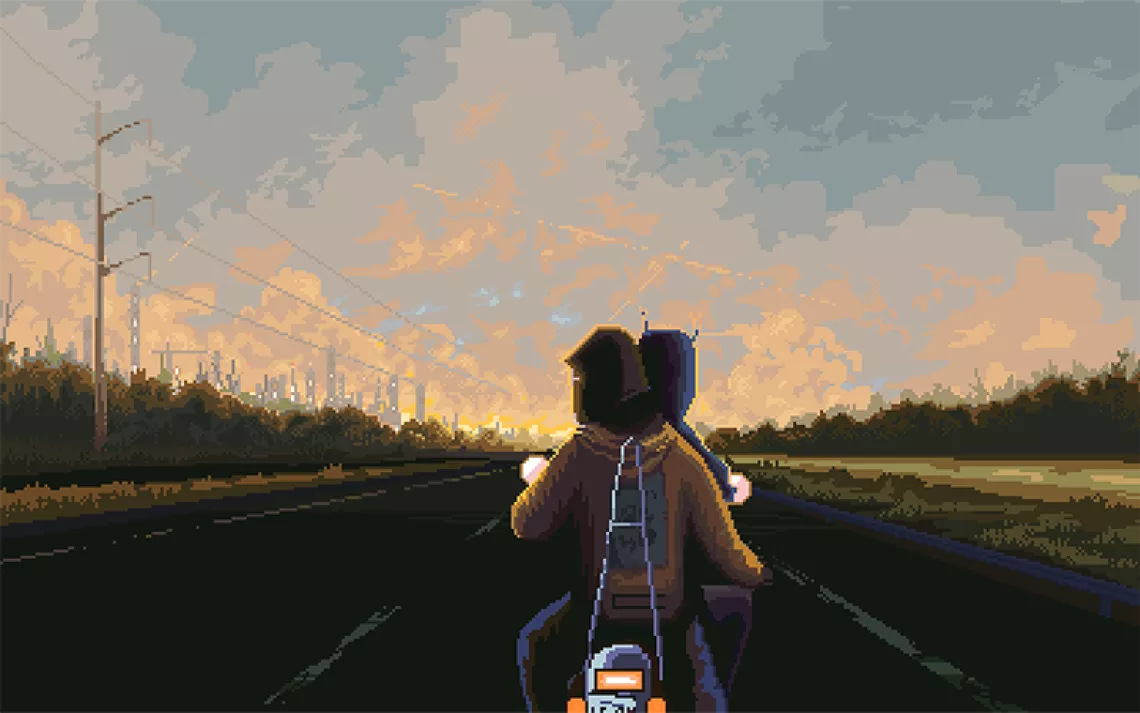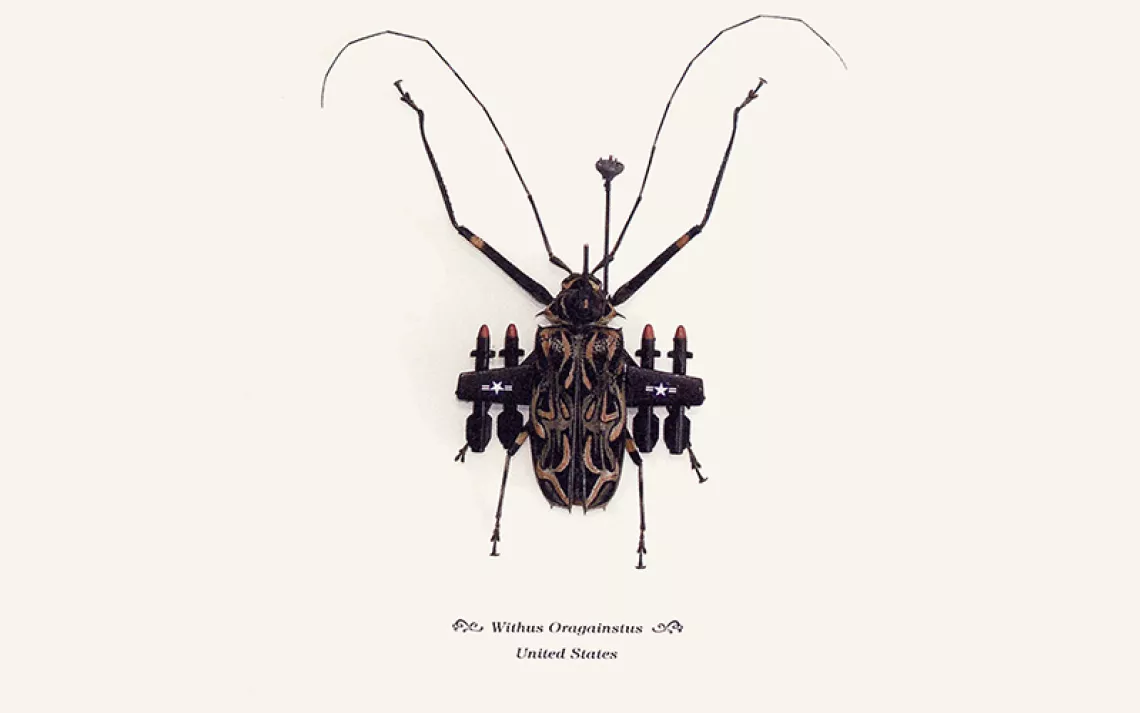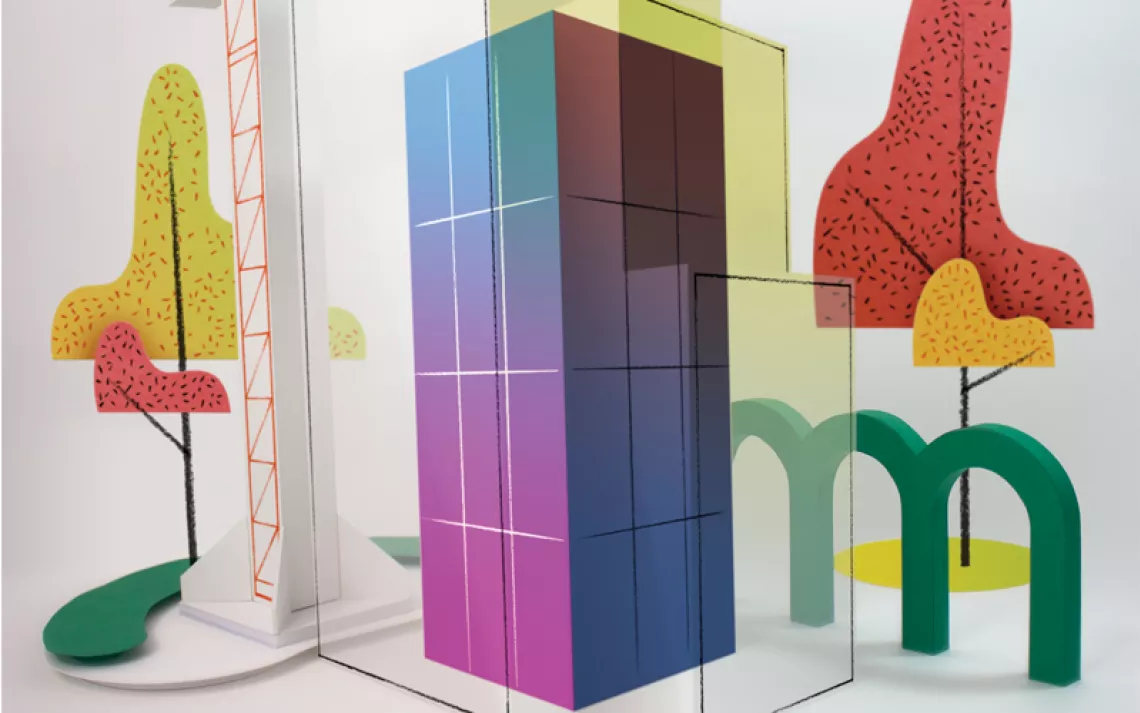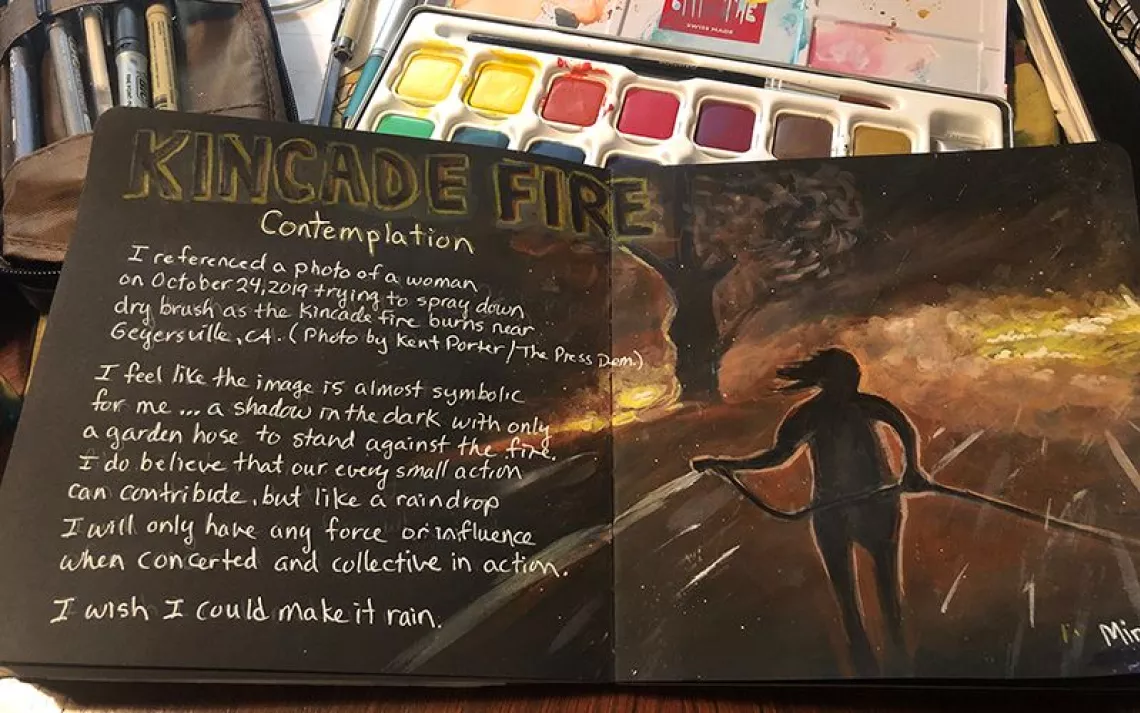Self-Taught Rock Star
Adventures with a jeweler/citizen geologist whose passion is “edu-tainment”
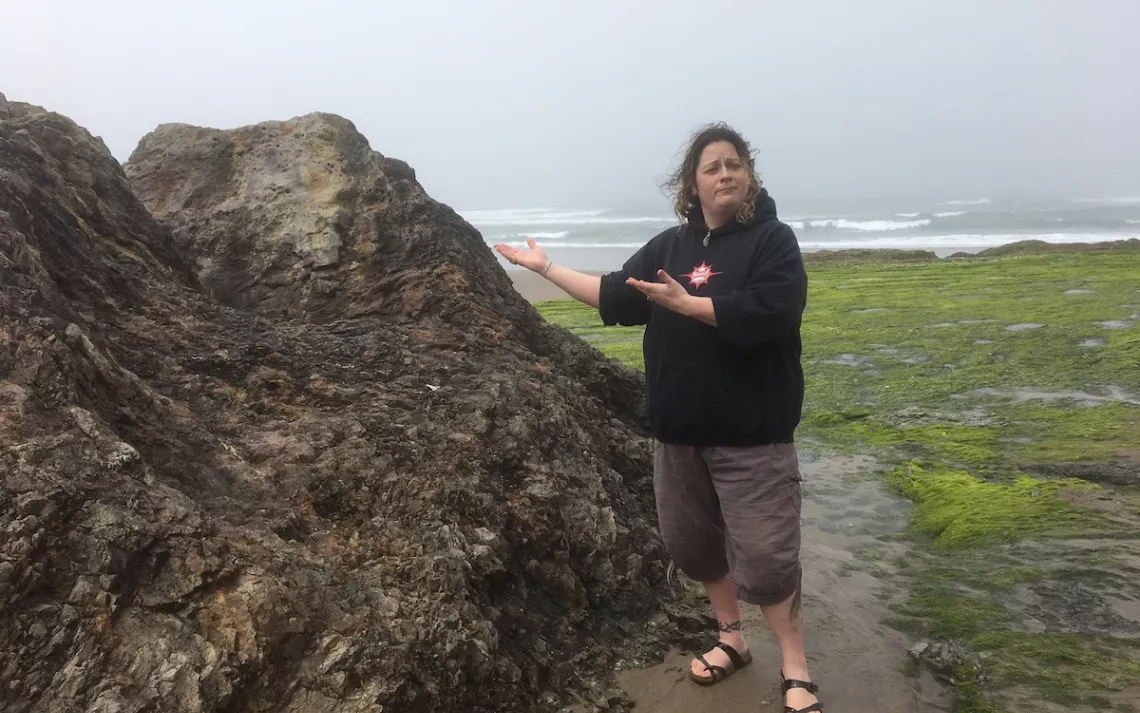
Photos courtesy of Britany Robinson
You don’t have to dive into the icy Pacific to appreciate the unique beauty of the Oregon coast—one can simply stand on the beach, wrapped in chilly air, and witness the jagged cliffs and giant boulders protruding from frothy waves. In the same vein, you don’t have to become a geologist to appreciate the fascinating history that can be read on a rock. You could, for instance, just take a walk down to the beach with Laura Joki, owner of Rock Your World: Pacific Northwest Gem and Jewelry Gallery, located near the Oregon coastline in Lincoln City.
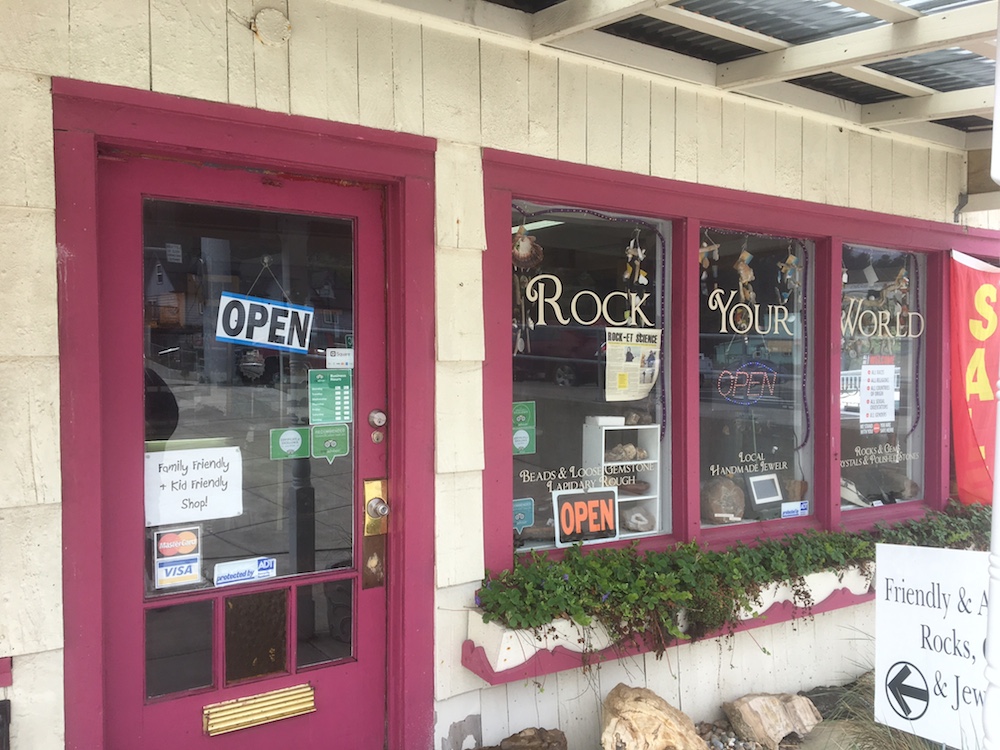 At a glance, Rock Your World appears not unlike any old rock shop found in touristy coastal towns. There are bins of basic pebbles and sparkling crystals, as well as glass cases of jewelry, ranging from simple stones set into ring bands and hanging from chains to elegant composites of colorful, polished gems.
At a glance, Rock Your World appears not unlike any old rock shop found in touristy coastal towns. There are bins of basic pebbles and sparkling crystals, as well as glass cases of jewelry, ranging from simple stones set into ring bands and hanging from chains to elegant composites of colorful, polished gems.
Visitors often prefer their rocks in the form of jewelry, Joki says, because it gives them a way to engage with the natural objects—which might otherwise collect dust on a shelf. It wasn’t until opening the shop that Joki began teaching herself wire wrapping and stone cutting via YouTube videos. While she grew to love the craft, jewelry remains an afterthought. What she really wants to talk about is a big dike—a sheetlike igneous body often oriented to the bedding of intruding rocks—that she recently found on the beach.
A self-taught (and later, professionally educated) “rock hound,” Joki first identified a volcanic rock called rhyolite in a boulder on the beach of Lincoln City in 2013. Rhyolite only appears when the crust of the Earth melts, and Joki believes this rhyolite was formed by a super volcano.
Many people are familiar with the very visible chain of volcanoes that make up the Cascade Range in the Pacific Northwest—when the clouds above Oregon part, the peaks of Mt. Hood, Mt. Adams, and St. Helens, among others, pop into view across the state. But Joki’s discovery points to a much more powerful, yet understated, volcano. The rhyolite in the Lincoln City boulder, she says, is evidence that a super volcano collided with the continental crust in this region, some 40 to 50 million years ago. Thanks to relatively new GPS information, scientists have discovered that slow-slip earthquakes have caused the coasts of Oregon and Washington to rotate between 45 and 80 degrees, allowing us to track a string of calderas and ancient geyser basins across a huge swath of the northwest—leading to the conclusion that this super volcano was partially responsible for a hot spot nearly 800 miles away, in Yellowstone National Park.
When she’s not at the shop, Joki leads rock-combing tours, in which she shares her knowledge of geology, oceanography, and volcanology with anyone with a burning curiosity and $20 to spare.
The rhyolite dike—which exists as a dark-brown rock about the size of a small car, standing alone in the middle of the sandy beach—is a highlight of the tour. “I love to bring people down here and say, ‘Welcome to Yellowstone!’” she says as we approach it.
“Hi there!” she says to a lone beach-walker who has paused to examine the boulder. “I’m here showing a journalist this rock because it’s evidence that the Yellowstone hot spot originated here.” The man looks mildly startled but amused.
“Just looks like a big rock to me!” the beach-walker replies.
“It is a big rock,” Joki says. “But a really cool one.”
Joki has been sharing her findings with any and all volcanologists and geologists she runs into. As a “citizen scientist,” Joki explains that she’s lacking the academic connections to push her discoveries into the mainstream conversation, but she’s in the process of preparing a presentation for the academic community.
We’re up close now, and Joki points out bands of color and clusters of varying textures across the dike. The rhyolite is a colorful lava, composed of mostly silica, which is extremely strong. That strength has caused the rhyolite to erode much more slowly than the softer mudstones that surround it on the beach. Such nitty-gritty clues make it easy to spot—to Joki, at least.
Geology terms roll effortlessly off her tongue. She’s amassed more than four years of both field and academic research and seems to pack it into each sentence, like sand condensing into rock.
Listening to her breathless science-speak, you might assume she has multiple degrees in these fields. In reality, Joki is a high school dropout.
The “dirty old rockhound,” as she’s known on Instagram, has been studying rocks since she was seven, when she first pored over the pages of her mother’s college geology book. Ever the curious and determined self-starter, she was taking college geology classes by the seventh grade. But after attending just one year of high school, Joki dropped out to work for her entrepreneurial parents.
Later in life, she spent years helping tech companies become successful through her expertise in business process architecture—developing blueprints that help organizations run more efficiently. But then she decided she didn’t want to help others succeed anymore. She wanted to help herself succeed. A trip to Lincoln City in 2011 sparked her imagination; there was no rock shop there.
“I went home to Portland and said to my husband, ‘Let’s get out of here.’ Portland wasn’t the city we once loved, and I was tired of working for people I didn’t believe in.”
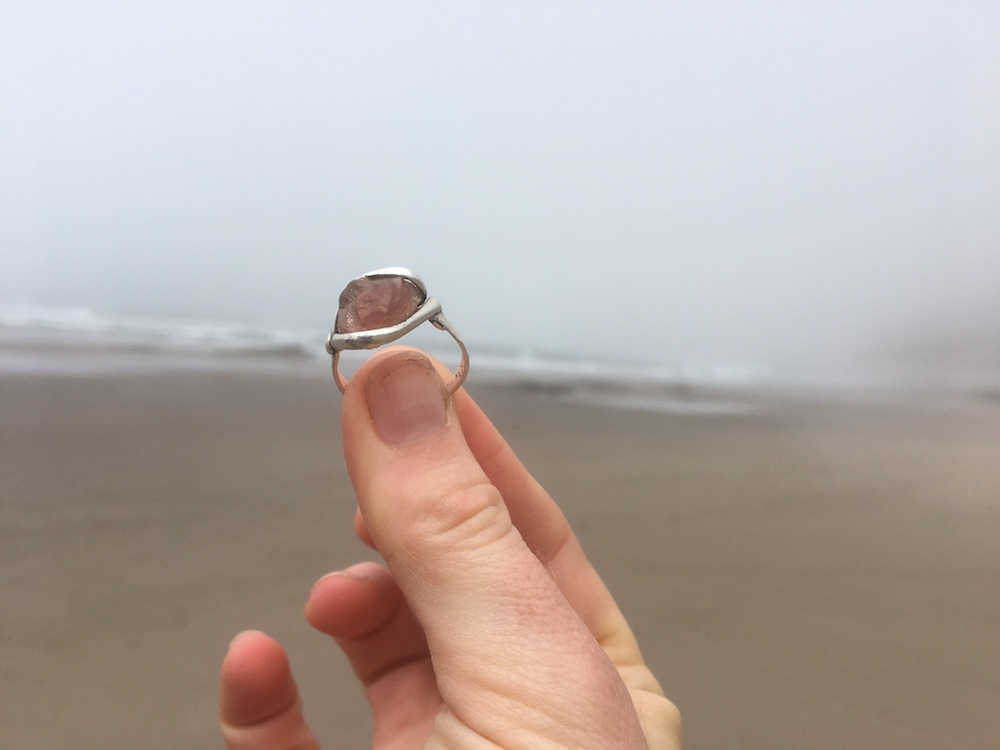 So they packed up their things and moved to the coast, where Joki could indulge her passion and knowledge in rocks, through “edu-tainment” tours (as she calls them), and by making jewelry at the shop. “I love the personal connection,” she says. “I love creating art that turns into a conversation about science.”
So they packed up their things and moved to the coast, where Joki could indulge her passion and knowledge in rocks, through “edu-tainment” tours (as she calls them), and by making jewelry at the shop. “I love the personal connection,” she says. “I love creating art that turns into a conversation about science.”
Joki offers multiple local rock clinics each month and is currently planning a workshop trip to the John Day Fossil Beds in eastern Oregon, where she’ll lead group trips to collect fossils and rocks around the colorful bands of ancient earth.
Not everyone will share Joki’s fascination for the science of the rock. However, interest in geology—as it relates to the Cascadia Subduction Zone—is on the rise, she says. The power of the ground beneath our feet has become much more interesting—terrifying even—since around 2015, when people in the Pacific Northwest and Northern California were made aware of the threat of a major earthquake and resulting tsunami, which could annihilate their shore.
As a coastal resident and a geology expert who is intimately aware of the power of rock and Earth, Joki takes this seriously. But she concedes that it isn’t worth stressing over. “Nature can kill you anywhere,” she notes with a shrug.
For now, she’ll keep offering enjoyable ways for visitors to learn about the nature of the Oregon coast. Whether it’s through jewelry, a beach walk, or curiosity about the potential of a natural disaster, Joki believes we’re all craving connection to the earth. She has her own in this life she’s built on the coast, and her mission is to help others find theirs, too.
 The Magazine of The Sierra Club
The Magazine of The Sierra Club
